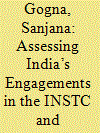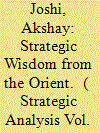| Srl | Item |
| 1 |
ID:
164533


|
|
|
|
|
| Summary/Abstract |
The INSTC formalised by India, Iran and Russia at the start of the new millennium to develope an alternative transport system linking India with Central Asia and Eurasia floundered for long due to scepticism and neglect by its member states. However, the withdrawal of the UN sanctions against Iran, the steady expansion of the Chinese influence in the region through the OBOR, and the urgent requirement of the land-locked Central Asian countries to gain maritime access offer new incentives for the member states to reinvigorate the project. This article explores the commercial and the strategic implications of the INSTC for India in the present context. .
|
|
|
|
|
|
|
|
|
|
|
|
|
|
|
|
| 2 |
ID:
164534


|
|
|
|
|
| Summary/Abstract |
India–Japan defence ties that began less than a decade ago have witnessed unprecedented progress. Until recently they were dominated by military exercises, training and regular dialogues, but now they are entering a new and crucial phase as they embark on ambitious joint research on advanced technologies and development of systems which will have considerable implications for their strategic partnership as well as to Indo-Pacific security. It is imprudent to surmise that this is entirely due to China; rather, a variety of factors are contributing to the burgeoning defence relations. The strategy for consolidating defence links is to create institutional mechanisms at various levels and constantly scale-up cooperation.
|
|
|
|
|
|
|
|
|
|
|
|
|
|
|
|
| 3 |
ID:
164535


|
|
|
|
|
| Summary/Abstract |
Over the past four decades, the relationship between Iran and the US has been marked by conflicts, ranging from hostage-taking and sanctions to military confrontation. The present research aims at explaining the dispute by referring to the mindsets of the two countries’ leaders and exploring their epistemological origins. The main question this article seeks to answer is: what are the roots of disputes in US–Iran relationship in the post-Revolutionary era? The hypothesis is that the US governments’ materialistic and Iranian leadership’s idealist, ideational and identity-oriented approaches have led to diverging perceptions on different issues at stake. This has precluded a common understanding between the leaderships of the two countries.
|
|
|
|
|
|
|
|
|
|
|
|
|
|
|
|
| 4 |
ID:
164536


|
|
|
|
|
| Summary/Abstract |
The Sykes–Picot Agreement, the Iranian Revolution, the Gulf Wars, and other events that have unfolded after the Arab Uprising (the Arab Spring), have altered the course of West Asian history. Saudi Arabia and Iran are the new architects determining the course and its trajectory; also significant is the presence of foreign powers. As is evident that oil has been a crucial factor behind the West’s interests in the region. The article states that the new Cold War can be explained as a variance between Iran and Saudi Arabia; and the situation manoeuvred by foreign actors. The region’s geostrategic significance coupled with resource politics and aspiring influence, apart from the sectarian dimension, has been the motivating factor for the emergent squabble between the regional and global players. Much of it can be seen in the context of the geostrategic energy war in Syria, proxy wars in countries like Yemen and political unrest in Bahrain, also risking smaller vulnerable states like Qatar and Lebanon. The article argues that the current situation is a product of a struggle between the two regional powers and the positioning of the US and Russia in the changing dynamics. It evaluates the continuing adversity, emphasising that the crisis is significantly driven by geo-economic factors, and is not merely confined to the regional hegemony aspect.
|
|
|
|
|
|
|
|
|
|
|
|
|
|
|
|
| 5 |
ID:
164537


|
|
|